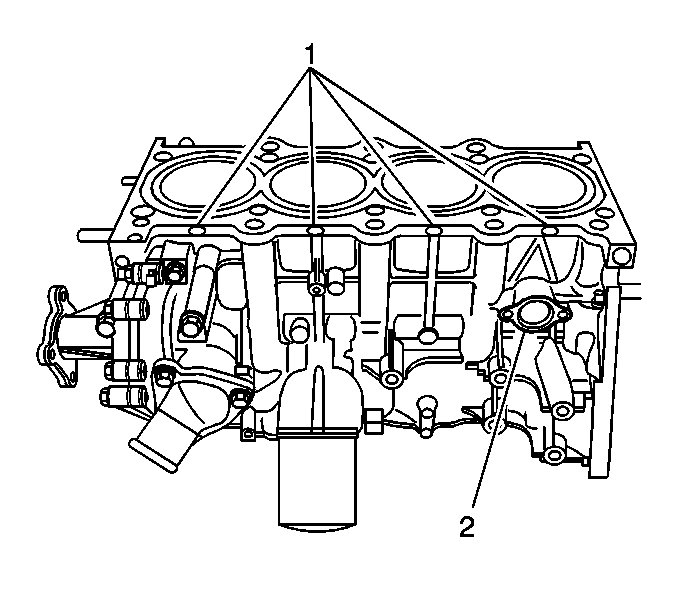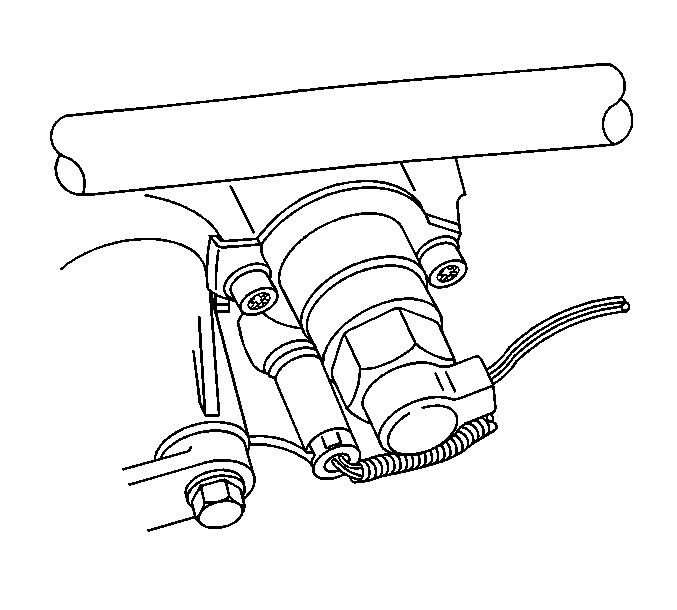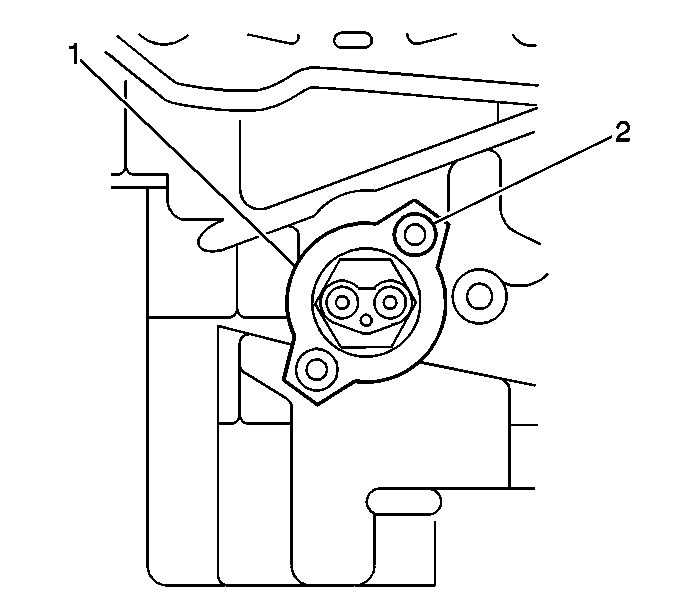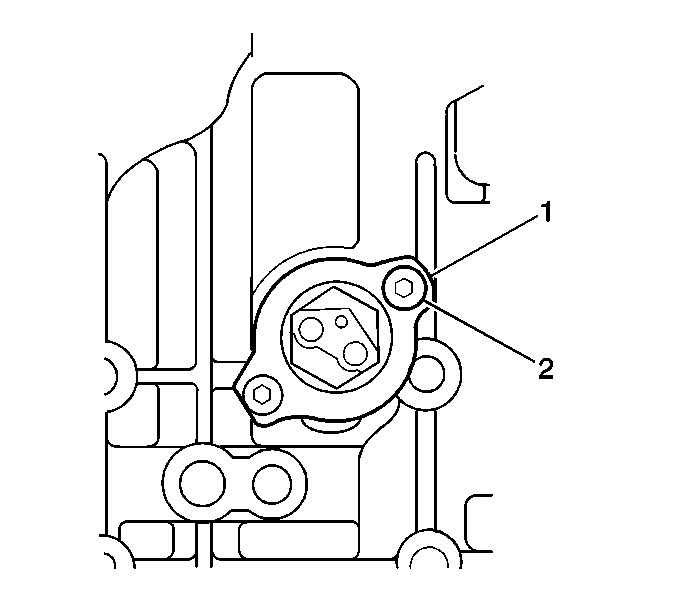Coolant Heater Replacement 2.0L Engine
Removal Procedure
- Drain the coolant. Refer to Cooling System Draining and Filling .
- Remove the heat shield from the exhaust manifold. Refer to Exhaust Manifold Replacement in Engine Mechanical--2.0L.
- If necessary, remove the engine block core plug (2).
- Disconnect the electrical cord connector from the engine coolant heater.
- Remove the screw from each end of the heater element retaining bracket.
- Remove the bracket and the engine coolant heater from the engine block.
- Inspect the hole in the block for smoothness. Remove any burrs or rough spots.

Use a hammer and a punch or a screwdriver to knock the core plug loose and to one side within the engine block. Remove the core plug with pliers.

Installation Procedure
- Apply a coat of petroleum jelly to the heater opening and the O-ring.
- Insert the engine coolant heater into the hole in the engine block (2).
- Install the engine coolant heater retainer bracket over the engine coolant heater, with the bent tabs facing the engine.
- Tighten the engine cooler heater screws.
- Install the heat shield to the exhaust manifold. Refer to Exhaust Manifold Replacement in Engine Mechanical--2.0L.
- Connect the electrical cord connector to the engine coolant heater.
- Route and secure the cord.
- Fill the cooling system. Refer to Cooling System Draining and Filling .
- Inspect the cooling system for leaks.

Notice: Refer to Block Heater Element Position Notice in the Preface section.

Notice: Use the correct fastener in the correct location. Replacement fasteners must be the correct part number for that application. Fasteners requiring replacement or fasteners requiring the use of thread locking compound or sealant are identified in the service procedure. Do not use paints, lubricants, or corrosion inhibitors on fasteners or fastener joint surfaces unless specified. These coatings affect fastener torque and joint clamping force and may damage the fastener. Use the correct tightening sequence and specifications when installing fasteners in order to avoid damage to parts and systems.
Tighten
Tighten the engine coolant heater screws to 14 N·m (10 lb ft).
Caution: A block heater electrical cord that is damaged creates a shock hazard, and must be replaced.
Notice: The heater cord must not touch the engine, hot pipes, manifold, or any moving parts. Route the cord to the left front of the engine compartment securing with tie straps as necessary to prevent damage.
Important: Do not secure the block heater cord to the brake, fuel or vacuum lines. The cord and the tie straps could chafe the lines and lead to corrosion on the lines.
Coolant Heater Replacement 2.5L Engine
Removal Procedure
- Drain the coolant. Refer to Cooling System Draining and Filling .
- Remove the exhaust manifold. Refer to Exhaust Manifold Replacement in Engine Exhaust.
- Disconnect the electrical cord connector from the engine coolant heater.
- Remove the screw (2) from each end of the heater element retaining bracket.
- Remove the bracket and the engine coolant heater from the engine block.
- Inspect the hole in the block for smoothness. Remove any burrs or rough spots.


Installation Procedure
- Apply a coat of petroleum jelly to the heater opening and the O-ring.
- Insert the engine coolant heater (1) into the hole in the engine block.
- Install the engine coolant heater retainer bracket over the engine coolant heater, with the bent tabs facing the engine.
- Tighten the engine cooler heater screws.
- Install the exhaust manifold. Refer to Exhaust Manifold Replacement in Engine Exhaust.
- Connect the electrical cord connector to the engine coolant heater.
- Route and secure the cord.
- Fill the cooling system. Refer to Cooling System Draining and Filling .
- Inspect the cooling system for leaks.

Notice: The block heater element must not touch the engine block inner wall in the installed position or damage to the engine block and the block heater could result.

Notice: Use the correct fastener in the correct location. Replacement fasteners must be the correct part number for that application. Fasteners requiring replacement or fasteners requiring the use of thread locking compound or sealant are identified in the service procedure. Do not use paints, lubricants, or corrosion inhibitors on fasteners or fastener joint surfaces unless specified. These coatings affect fastener torque and joint clamping force and may damage the fastener. Use the correct tightening sequence and specifications when installing fasteners in order to avoid damage to parts and systems.
Tighten
Tighten the engine coolant heater screws to 7 N·m (5.5 lb ft).
Caution: A block heater electrical cord that is damaged creates a shock hazard, and must be replaced.
Notice: The heater cord must not touch the engine, hot pipes, manifold, or any moving parts. Route the cord to the left front of the engine compartment securing with tie straps as necessary to prevent damage.
Important: Do not secure the block heater cord to the brake, fuel or vacuum lines. The cord and the tie straps could chafe the lines and lead to corrosion on the lines.
Coolant Heater Replacement 1.6L Engine
Removal Procedure
- Drain the coolant. Refer to Cooling System Draining and Filling .
- Remove the exhaust manifold. Refer to Exhaust Manifold Replacement in Engine Exhaust.
- Disconnect the electrical cord connector from the engine coolant heater.
- Remove the screw (2) from each end of the heater element retaining bracket.
- Remove the bracket and the engine coolant heater from the engine block.
- Inspect the hole in the block for smoothness. Remove any burrs or rough spots.


Installation Procedure
- Apply a coat of petroleum jelly to the heater opening and the O-ring.
- Insert the engine coolant heater (1) into the hole in the engine block.
- Install the engine coolant heater retainer bracket over the engine coolant heater, with the bent tabs facing the engine.
- Tighten the engine cooler heater screws.
- Install the exhaust manifold. Refer to Exhaust Manifold Replacement in Engine Exhaust.
- Connect the electrical cord connector to the engine coolant heater.
- Route and secure the cord.
- Fill the cooling system. Refer to Cooling System Draining and Filling .
- Inspect the cooling system for leaks.

Notice: The block heater element must not touch the engine block inner wall in the installed position or damage to the engine block and the block heater could result.

Notice: Use the correct fastener in the correct location. Replacement fasteners must be the correct part number for that application. Fasteners requiring replacement or fasteners requiring the use of thread locking compound or sealant are identified in the service procedure. Do not use paints, lubricants, or corrosion inhibitors on fasteners or fastener joint surfaces unless specified. These coatings affect fastener torque and joint clamping force and may damage the fastener. Use the correct tightening sequence and specifications when installing fasteners in order to avoid damage to parts and systems.
Tighten
Tighten the engine coolant heater screws to 7 N·m (5.5 lb ft).
Caution: A block heater electrical cord that is damaged creates a shock hazard, and must be replaced.
Notice: The heater cord must not touch the engine, hot pipes, manifold, or any moving parts. Route the cord to the left front of the engine compartment securing with tie straps as necessary to prevent damage.
Important: Do not secure the block heater cord to the brake, fuel or vacuum lines. The cord and the tie straps could chafe the lines and lead to corrosion on the lines.
